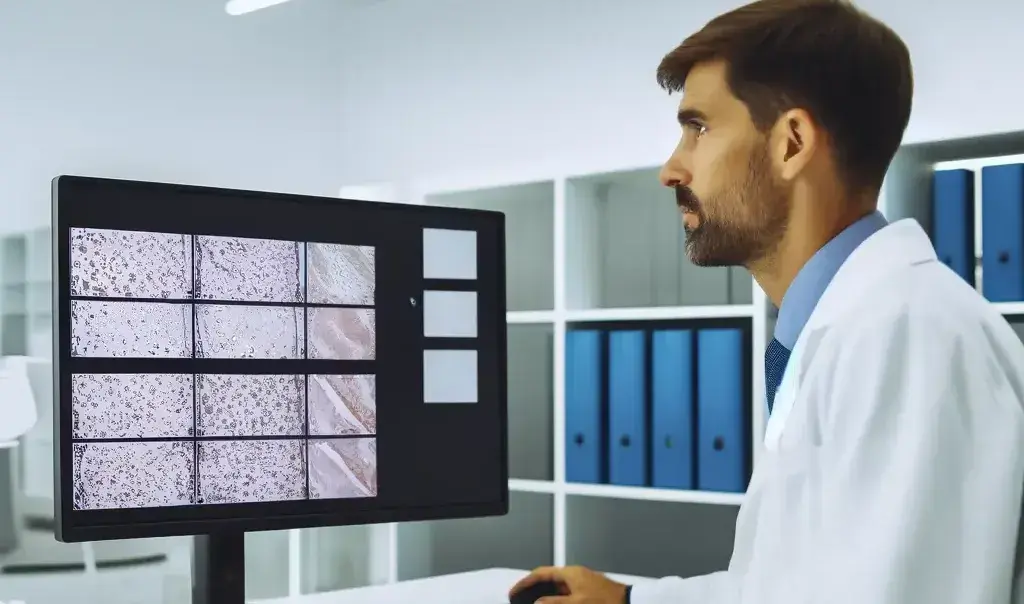Transforming Small Pathology Practices with Digital Pathology
RECRUITING DONE RIGHT, PATHOLOGISTS RECRUITERS, PATHOLOGY RECRUITERS
The shortage of pathologists is a significant issue, particularly for small, rural pathology groups. These practices often struggle to attract and retain full-time specialists, which can impede their ability to provide timely and accurate diagnoses. Digital pathology is revolutionizing how these small groups operate, offering tools and techniques that enhance efficiency and accuracy. These advancements can significantly impact workflow and diagnostic capabilities for practices with three to five pathologists.
Recent Advancements
Recent innovations in digital pathology have made it more accessible and practical for smaller practices. For instance, advancements in digital imaging allow pathology labs to send high-resolution images of slides to remote pathologists. This is particularly useful in subspecialties where accurate diagnosis of complex conditions requires a specialist’s input.
A relevant example is a small pathology lab in a rural area that uses digital pathology to consult with a subspecialized pathologist in another city for complex cases. This quick and efficient collaboration improves the accuracy of diagnoses and accelerates patient treatment timelines.
Key Benefits
Enhanced Collaboration: Digital pathology facilitates collaboration with specialists regardless of location, making it easier for small labs to consult with top experts.
Access to Specialty Help: Small pathology groups often face challenges in attracting full-time specialists. Digital pathology allows these practices to send images to remote pathologists, such as subspecialized pathologists, for challenging cases. This method is much faster than traditional medical couriers, ensuring timely consultations and better patient care.
Locum Coverage: When a pathologist goes on vacation or is otherwise unavailable, digital pathology enables seamless locum coverage by allowing remote pathologists to access and review cases without delay.
Business Expansion: Small pathology groups can expand their business and serve more hospitals and clients by leveraging digital pathology. This innovation allows them to secure contracts with more hospitals, as they can ensure that pathologists are available to read slides efficiently, thereby meeting the contractual requirements.
Challenges and Solutions
While the adoption of digital pathology offers many benefits, there are challenges, such as high initial costs and the need for training. Solutions include seeking affordable, scalable digital pathology systems and participating in training programs offered by vendors or industry conferences. One practical way for small practices to get started is by purchasing an inexpensive digital pathology scanner, which allows them to digitize slides and begin leveraging the benefits of digital pathology without a significant upfront investment.
Recommended Digital Pathology Scanners
Here is a table of scanners. The first four listed are best suited for small-to-medium-sized pathology groups. If you need assistance reaching out to one of these companies, let me know, and we can help you.
| Vendor | Price of Scanner | Volume of Slides | Ease of Installation and Use | FDA Approval for Primary Clinical Diagnostics | Magnification |
|---|---|---|---|---|---|
| Grundium Ocus™40 | $25,000 | 40 slides per hour | Moderate | Not specified | 20x/40x |
| Accu-Scope | $25,000 - $50,000 | 100 slides per day | Moderate | Not specified | 20x/40x |
| Motic Digital Pathology | $20,000 - $50,000 | 100 slides per day | Moderate | Not specified | 20x/40x |
| OptraSCAN | $25,000+ | 6 to 120 slides | Moderate | Not specified | Not specified |
| Hamamatsu Photonics K.K. (NanoZoomer S20MD) | $70,000 - $100,000 | 80 slides per hour | Compact, easy to integrate | Yes, for primary diagnosis (IVDR (EU), UKCA (UK), IvDO (CH)) | 20x/40x |
| Hamamatsu Photonics K.K. | $150,000 - $250,000 | 210 slides per day | Not specified | Yes, for primary diagnosis | 20x/40x |
| Roche Diagnostics (Ventana DP 200) | ~$200,000 | 360 slides per day | Moderate | Yes, for primary diagnosis | 20x/40x |
| Leica Biosystems | ~$250,000 | 400 slides per day | Easy | Yes, for primary diagnosis | 20x/40x |
| Philips IntelliSite Pathology Solution | $100,000 - $300,000 | 300 slides per day | Easy | Yes, for primary diagnosis | 40x (0.25 μm/pixel) |
| 3DHistech (Pannoramic 1000) | ~$270,000 | Up to 1000 slides | Moderate | Not specified | 41x/82x |
Notes:
- Philips IntelliSite Pathology Solution: This is the first whole slide imaging system approved by the FDA for primary diagnosis. It allows pathologists to review and interpret digital images of surgical pathology slides prepared from formalin-fixed paraffin-embedded tissue. This system is approved for primary clinical diagnostics.
- Leica Biosystems: Their digital pathology systems, including the Aperio AT2 DX, are FDA-cleared for primary diagnosis. These systems provide high-quality imaging and are suitable for various clinical settings.
- Roche Diagnostics (Ventana DP 200): This system is FDA-cleared for primary diagnosis, supporting high-throughput labs with automated and high-quality imaging capabilities.
- Hamamatsu Photonics K.K.: Their digital pathology scanners are also FDA-cleared for primary clinical diagnostics, providing reliable and high-resolution imaging solutions.
- Grundium Ocus™40: Priced at $25,000, this scanner is designed for versatility and precision in digital pathology, suitable for remote consultations, research, and education. It has a magnification of up to 40x.
- 3DHistech (Pannoramic 1000): Priced at approximately $270,000, this scanner offers up to 82x magnification, making it suitable for high-volume whole-slide imaging with a capacity of up to 1000 slides. It provides exceptional image quality and supports a high throughput of slides.
Future Prospects
Small pathology practices can expect further integration of AI and machine learning in their diagnostic processes. These technologies will continue to evolve, offering more sophisticated disease detection and management tools. Developing comprehensive datasets highlights the potential for more accurate AI applications in everyday pathology practice.
Conclusion
Digital pathology is a game-changer for small pathology groups, providing tools that enhance diagnostic accuracy, workflow efficiency, and collaborative opportunities. By embracing these technologies, small practices can significantly improve their services and outcomes. It also addresses the critical need for specialty help in rural areas and during locum coverage, ensuring continuous, high-quality patient care.
If you're a small pathology practice looking to explore digital pathology, start by attending industry conferences, requesting demos of digital pathology systems, and connecting with vendors who offer scalable solutions tailored to your needs. Engage with the community and stay informed about the latest advancements to make the most of digital pathology. For those just starting, consider investing in an affordable digital pathology scanner to begin realizing the benefits immediately.
About Connexis Search Group
Connexis Search Group has recruited pathologists for 22 years and maintains an extensive database of more than 28,000 pathologists in the United States. We place all types of pathologists, including subspecialty pathologists such as GI, Dermatopathology, GU, Molecular, Hematopathologists, and Pediatric Pathologists. Our expertise and vast network enable us to meet the unique needs of small pathology practices, ensuring they have access to the best talent in the field.




No Comments